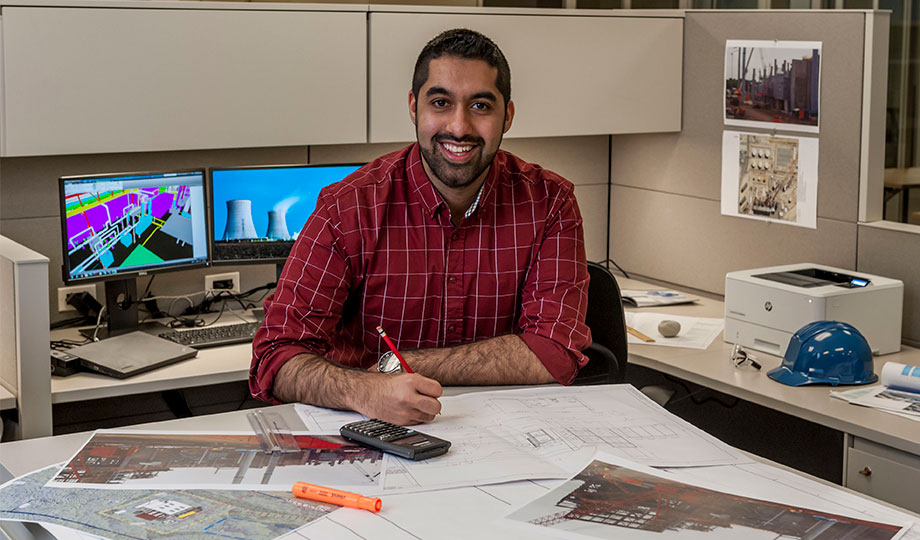College of DuPage provides physics instruction using the best in educational technology and research. Physics students study laws of motion, forces, energy and momentum and learn how physics work in society and in the modern era. Take physics courses at COD and easily transfer your credits to four-year schools in the region.
Many students take physics because they have an interest in majoring in physics or biology or to fulfill a science requirement. The Physics program has three levels of study for students interested in the field:
- Physics 1100 is a general survey course for liberal arts students.
- Physics 1201 and 1202 comprise a one-year exploration of general principles, recommended for students who want a one-year sequence of lab science and/or who intend to major in biology or a pre-professional area.
- Physics 2111, 2112 and 2115 is the sequence of choice for other science majors and for engineering majors.
College of DuPage offers a Physics Associate in Engineering Science Transfer Pathway degree for students who want to complete their associate degree and transfer to another institution.
Students who plan to major in physics should have a strong aptitude for mathematics. Prior to registration, you should meet with a program advisor for course selection and to determine what courses will be best for you.
Determine Your Path
Physicists are employed in a variety of industries, conducting applied research in education and government, hospitals and clinics. They also perform fundamental research in educational and federal institution. Many physicists tend to be generalists and find jobs in unrelated fields including software development and electrical engineering.
While most physics majors go on for advanced degrees, some jobs are available for those with a bachelor's degree. Most jobs in the industry require a bachelor's or master's degree, while those doing fundamental research require a doctorate.
You want to attend a college that stands out from the rest. At COD, you'll discover:
- Dedicated instructors with years of academic and professional experience.
- Instruction utilizing top-notch facilities including a state-of-the-art Physics Lab..
- Affordable programs to help students achieve success without creating overwhelming debt or draining a savings account.
- Small class sizes that ensure students receive personalized attention.
- Opportunity to easily transfer engineering and physics course credits to other institutions.
Physics Transfer Pathway, A.E.S.
What is a Transfer Pathway?
A transfer pathway represents a typical course schedule/sequence for a student planning to complete the A.E.S. degree within two years, then transfer and major in a specific discipline. A transfer pathway is not institution-specific.
It is important to understand that the pathway provided in the adjacent tab is just one possible combination of classes by which to complete an A.E.S. and prepare for transfer in your chosen area of study. Other course combinations and sequences can work, too. It is strongly recommended that students work directly and frequently with a COD academic counselor/advisor, a COD faculty advisor, and academic counselors/advisors at potential transfer schools, to develop and execute a plan that works best for them.
Get Started Today
The first step to getting started in physics is to apply for admission.
Academic and Career Pathways give you a roadmap to achieving your career goals. Follow a pathway based on your degree or certificate that outlines which classes you need to take and when so you graduate on time or move on to the next phase in your career.
Physics program graduates will:
- Learn how to relate the mathematical concepts of algebra, vectors, and calculus to physical situations
- Be able to describe motion of an object in terms of position, velocity, and acceleration
- Gain a Newtonian view of the mechanics (e.g. understand and apply Newton’s 2nd law)
- Understand the concept of conserved quantities (e.g. momentum, energy, and charge)
- Have a basic understanding of coordinate systems and how to shift between different systems
- Distinguish the concepts of fields and flux
- Learn the ability to choose the optimal method and coordinate system to solve a physical problem (e.g. Newton’s Laws, conservation laws, etc.)
- Understand the connection between Newtonian forces and electrical fields, electrical potential, and energy
College of DuPage partners with several four-year institutions to help students seamlessly complete a bachelor’s degree in physics. Students can connect with Transfer Services for personalized guidance on transfer opportunities.
For more information about Transfer Pathways, visit the College of DuPage Catalog. The pathway outlines a typical two-year course plan for completing an AA or AS degree before transferring to a four-year program. Course requirements vary by institution, so consult your faculty or academic advisor for specific guidance.
Articulation Agreements
College of DuPage maintains transfer agreements with many colleges and universities to ensure a smooth transition toward a bachelor’s degree. These agreements often include a defined course sequence. Students should regularly meet with a faculty member or Advising Services to stay on track.- Elmhurst University, AS to Bachelor of Arts in Physics with Licensure
- Elmhurst University, AS to Broadfield Science Secondary Education Licensure with Physics Concentration
Transfer Guides
Beyond articulation agreements and guaranteed admission programs, College of DuPage courses transfer to many other institutions. Transfer Guides help students select COD courses that meet prerequisites for specific majors and include details such as contact information, major requirements, general education requirements, and transfer policies.
Career Information
Explore careers based on your interest, location and salary range or view top occupations by income.






